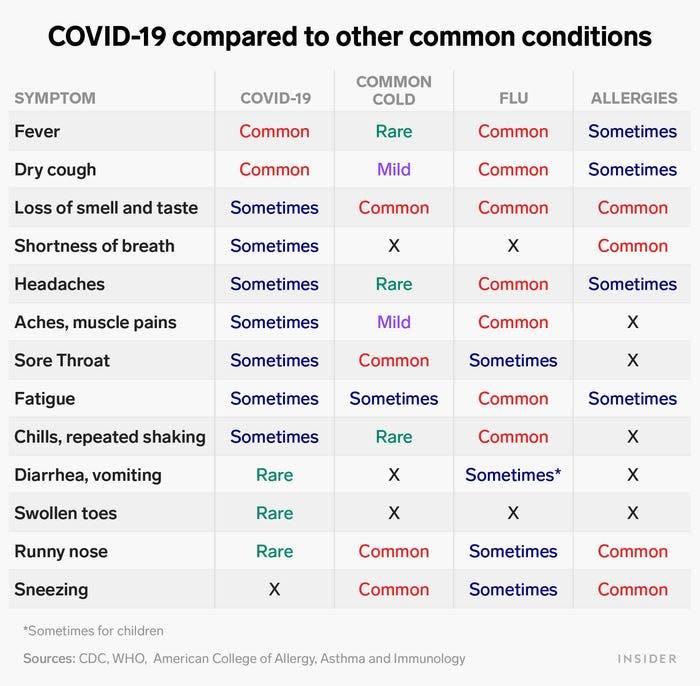What are the symptoms of the flu? Aches, chills, coughing and more

The most common flu symptoms are body aches, chills, cough, fatigue, fever, and headache; less common symptoms of the flu include sore throat, vomiting, and diarrhea.
The only way to know for sure that you have the flu is to get tested at the doctor's office with a nasal or throat swab.
If you think you have the flu and work with high-risk people, like children or the elderly, make sure you take precautions to prevent the spread of infection.
This article was reviewed by Rod Oskouian, MD, at the Swedish Neuroscience Institute.
The human influenza virus — aka the flu — is highly contagious and is spread through the respiratory system, nose, and throat. This can lead to classic flu symptoms like a cough, stuffy nose, and sore throat.
But many flu-like symptoms can overlap with other conditions like the common cold, allergies, and COVID-19. Here's some helpful tips to determine if you have the flu, or something else.
Symptoms of the flu
The most common symptoms of the flu include:
Chills
Cough
Fatigue
Fever
Headache
Less common symptoms of the flu include:
Vomiting
Diarrhea
Sneezing
Sore throat
It's important to note that symptoms can vary slightly from person to person.
"One person may tell you they had the worst chills of their life, and another may say they coughed for four weeks," says Emily Landon, an epidemiologist at the University of Chicago Medicine.
But if it's the flu, everyone experiences those hallmark symptoms "whether you're 2 or 200."
How do I know if I have the flu?
Your symptoms are a good start to figuring out if you have the flu or something else. Here's a chart comparing the flu with other common illnesses, including the novel coronavirus:

However, the only way to know for sure whether it's the flu is a nasal or throat swab test at the doctor's office.
If you've recently been vaccinated against the flu and are experiencing flu-like symptoms, it's still possible that you have it. Because you can still get the flu after a flu shot, though your chances are lower.
Other times, Landon says that people think they have the flu, but they're sick with something else entirely — a fungal infection, bacterial pneumonia, or even a heart attack.
And if you've got a 24-hour case of vomiting or diarrhea: "That's not the flu," she says. "That's probably norovirus or some other winter virus." If that's the case, check out our article on what you can eat to help relieve those symptoms.
People at high risk from the flu
The flu can infect anybody but there are certain populations at higher risk of developing complications from the infection. These demographics include:
Seniors over the age of 65
People with diabetes
People with heart disease or hypertension
Anyone with a chronic medical condition that leaves them immunocompromised
Pregnant women are considered a high-risk flu group, which is why they should get a flu shot. Flu in the third trimester increases the risk of early labor and makes women more likely to spread the virus to the newborn baby.
"That can be avoided by getting the flu shot, washing your hands, and not being around other people who are sick," Landon says. And don't worry about confusing flu symptoms with general pregnancy discomfort.
"Pregnant misery is one thing. Early on in pregnancy, you may be tired, have nausea, not feel great," Landon says. "You should not have chills, sweats, or fever." If you get the flu or fever when you're pregnant, see your doctor as soon as possible. Physicians can prescribe antiviral medications, which cut down on symptoms, help prevent complications, and take the edge off.
What to do if you feel the flu coming on
If you think you have the flu stay home and avoid contact with others as the flu is highly contagious.
Most people, who are otherwise healthy, do not need to seek medical care for their symptoms.
Instead, take it easy, get rest, reschedule plans, and call in sick from work or school. You should start to feel better in one to two weeks.
When to see a doctor
If you are around high-risk individuals like newborns or grandparents, it may be beneficial to get tested. Since the flu is highly contagious, knowing whether or not you have it can help prevent its spread
Finally, testing is especially important for individuals who may be unable to communicate their symptoms effectively like children or those with dementia.
Related stories about the flu:
Yes, the flu is contagious. Here's when you're most likely to spread the virus
You can't get the flu from the flu shot, but there are side effects
How long the flu should last and when you should see a doctor
The flu vaccine is not 100% effective but you should still get it every year
What you should eat and drink to get over the flu, according to doctors
Read the original article on Insider

